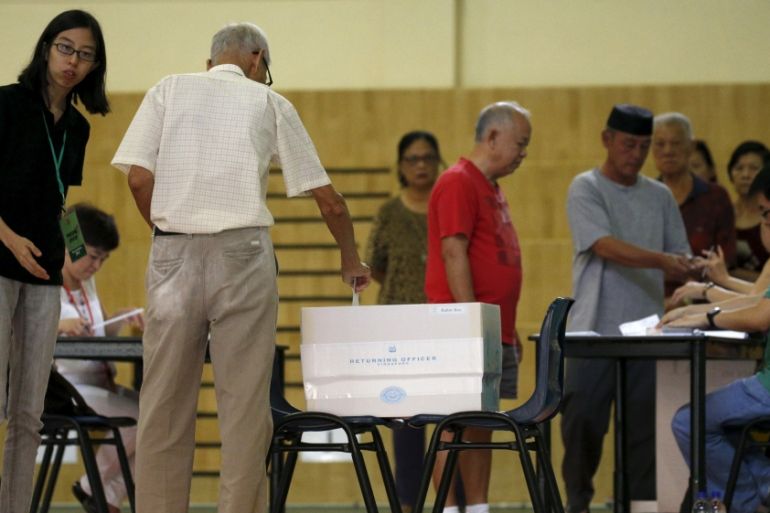Singapore poll set to test ruling party dominance
Voting begins in snap elections considered a test for Prime Minister Lee Hsien Loong’s People’s Action Party.

Voting has begun in Singapore in the city-state’s most hotly contested general election in recent years.
The vote on Friday could bring the sternest test to the long-ruling party’s dominance of politics even though it is widely expected to retain a clear majority in parliament.
Years of strong growth have turned the island nation into an international financial hub with spotless streets and malls, well-tended parks and living standards unmatched in Southeast Asia.
But the success and an influx of foreign workers has brought high property prices, crowded public transport, and a widening wealth gap which have fuelled resentment among many in a city that surveys regularly rank one of the world’s most expensive.
READ MORE: Singapore voters ask: How much change do we want?
Opposition parties are hoping to take advantage of the grumbling and are contesting all seats in parliament for the first time since independence in 1965.
They have focused their campaign on the bread-and-butter issues of jobs, healthcare and housing.
At one city centre polling station in the central district, about 30 mainly elderly people queued up before the voting began, while more than 100 people gathered outside a polling station in the city’s west.
“I think the government has been a bit shaky now since the last time, but every government is like that and bound to make mistakes. I think for now the [ruling party] PAP has treated us well,” said Ali, 62, a retired Singaporean who only gave his first name.

Preliminary results are expected from a couple of hours after the polls close at 8pm (1200 GMT).
Prime Minister Lee Hsien Loong’s People’s Action Party (PAP), which has ruled since independence, has a bedrock of support and will win the bulk of the 89 assembly seats but opposition inroads would challenge its effective dominance.
“In this election, we are showing a report card, we are proud of it,” Lee said in his last rally late on Wednesday, before a mandatory, election-eve cooling-off day.
The PAP’s share of the vote dropped to 60.1 percent in the last election, in 2011, its lowest ever. Nevertheless, it held 79 of a total 87 seats in the outgoing parliament.
The main opposition Workers’ Party held seven seats while one, that of former Prime Minister Lee Kuan Yew, the current prime minister’s father who died in March, was vacant.
The PAP is hoping that a sense of patriotism inspired by this year’s golden jubilee and of respect that followed the death of the elder Lee will work in its favour in the election.
Since 2011, Prime Minister Lee has also launched a multibillion-dollar healthcare insurance programme for the elderly, introduced cooling measures for the property market and curbed the flow of foreign workers.
Opinion polls are illegal and so no one is making confident predictions. Voting is compulsory and almost 2.5 million citizens can vote.